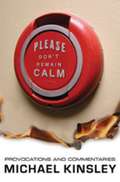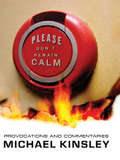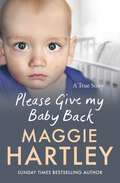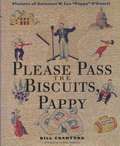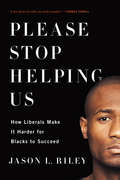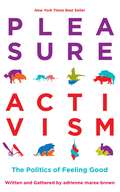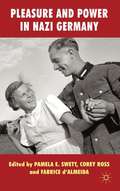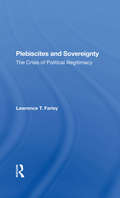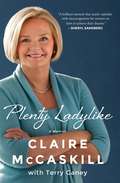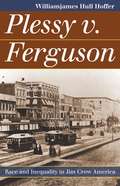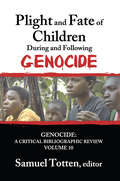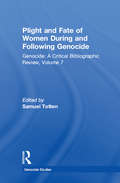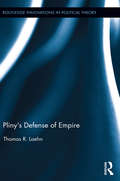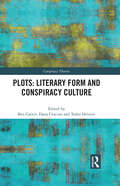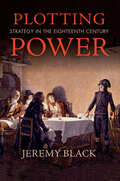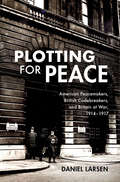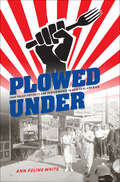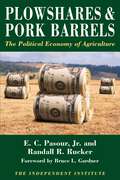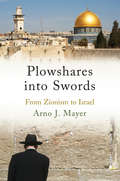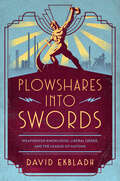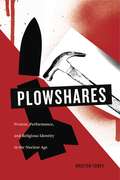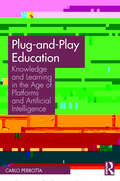- Table View
- List View
Please Don't Remain Calm: Provocations and Commentaries
by Michael KinsleyThis volume collects editorial columns penned by Slate founder and center-left political pundit Michael Kinsley between 1995 and 2007. Kinsley addresses a diverse range of topics, including the Wen Ho Lee case, Bush v. Gore, the definition of terrorism, the Martha Stewart insider trading case, the United Nations and the US war on Iraq, the Valerie Plame scandal, nostalgia for the late Ronald Reagan, and Supreme Court nominations, to name just a few. Annotation ©2008 Book News, Inc., Portland, OR (booknews.com)
Please Don't Remain Calm: Provocations and Commentaries
by Michael KinsleyA lucid deconstruction of the politics and public figures shaping the social, financial, and military disasters of our times. This selection of Michael Kinsley's trenchant editorial writing in Slate (and elsewhere) since 1995 covers the end of the Clinton era (Monica, impeachment, etc.) and two terms of George W. Bush (9/11, the War on Terror, Iraq, etc.).During this time Kinsley left Washington for Seattle and founded Slate, was opinion editor of the Los Angeles Times, underwent brain surgery for Parkinson's disease, and had other adventures that are reflected here. Although mostly about politics, there are articles and essays about other things, such as the future of newspapers, the existence of God, and why power women love Law and Order.This is the work of a writer at the top of his form. Kinsley's wit is a weapon that any talk-show host or elected blowhard should envy and fear, and the reader will cherish his sense of humor, which enlivens even the toughest subject matter.
Please Give My Baby Back (A Maggie Hartley Foster Carer Story)
by Maggie HartleyA new short-story from Britain's most-loved foster carer, perfect for fans of Cathy Glass and Casey Watson When a health visitor notices a bruise on her newborn son's leg, Robyn's world quickly falls apart. Before she knows what's happening, police are called and three-week-old Quinn is being taken to hospital to be examined. As Robyn can't give them any definite explanation as to what's caused the bruise, Quinn is immediately taken into care and given to Maggie to foster while Social Services investigate.With no idea how long the investigation will take and in total shock and distress that her newborn son has been taken from her, Robyn appeals to Maggie for help. But is Robyn really telling the truth that she hasn't harmed her baby? And if so, can Maggie help her prove her innocence and convince Social Services and the courts to let her bring Quinn home?
Please Give My Baby Back (A Maggie Hartley Foster Carer Story)
by Maggie HartleyA new short-story from Britain's most-loved foster carer, perfect for fans of Cathy Glass and Casey Watson When a health visitor notices a bruise on her newborn son's leg, Robyn's world quickly falls apart. Before she knows what's happening, police are called and three-week-old Quinn is being taken to hospital to be examined. As Robyn can't give them any definite explanation as to what's caused the bruise, Quinn is immediately taken into care and given to Maggie to foster while Social Services investigate.With no idea how long the investigation will take and in total shock and distress that her newborn son has been taken from her, Robyn appeals to Maggie for help. But is Robyn really telling the truth that she hasn't harmed her baby? And if so, can Maggie help her prove her innocence and convince Social Services and the courts to let her bring Quinn home?
Please Pass the Biscuits, Pappy: Pictures of Governor W. Lee "Pappy" O'Daniel
by John Anderson Bill CrawfordLong before movie stars Ronald Reagan and Arnold Schwarzenegger became governors of California, a popular radio personality with no previous political experience—who wasn't even registered to vote—swept into the governor's office of Texas. W. Lee "Pappy" O'Daniel was a 1930s businessman who discovered the power of radio to sell flour.<P><P> His musical shows with the Light Crust Doughboys (which launched the career of Bob Wills) and his radio homilies extolling family and Christian values found a vast, enthusiastic audience in Depression-era Texas. When Pappy decided to run for governor in 1938 as a way to sell more flour—a fact he proudly proclaimed throughout the campaign—the people of Texas voted for him in record numbers. And despite the ineptitude for politics he displayed once in office, Texans returned him to the governorship in 1940 and then elected him to the U.S. Senate in 1941 in a special election in which he defeated Lyndon Johnson, as well as to a full term as senator in 1942.
Please Scream Inside Your Heart: Breaking News and Nervous Breakdowns in the Year that Wouldn't End
by Dave PellFrom the publisher of the NextDraft newsletter comes a cathartic and humorous ride through the unnerving, maddening hellscape of the 2020 press cycle, reestablishing the line between "real" news and real life.Please lower your shoulder restraint and keep your hands and feet in. You&’re about to board a roller coaster ride through a year that was at once laughable and lethal.If you&’ve got an anti-anxiety prescription, now would probably be a good time to call in a refill.Please Scream Inside Your Heart is a time capsule; a real-time ride through the maddening hell that was the 2020 news cycle—when historic turmoil and media mania stretched American sanity, democracy, and toilet paper. Who better to examine this unhinged period in all of its twists and turns than news addict Dave Pell, aka the internet&’s Managing Editor? Fueled by the wisdom and advice of his two Holocaust-surviving parents, for whom parts of this story were all too familiar, Pell puts the key stories of 2020 into context with pith and punch; highlighting turning points that widened America&’s divisions, deepened our obsession with a media-driven civil war, and nearly knocked the country off its tracks. Pell also examines the role of technology in society—and how we somehow built the exact opposite of what we thought we were building. Why did the lies spread faster than the truth? How did our tech addiction contribute to the nightmare? Why do you feel a vibration in your pocket right now? In 2020, the news was everywhere, and everything was political—even the air we breathed. So brace yourself as you&’re hurtled through the twists and turns of the corkscrewiest year in American history; one that included two impeachment trials, a global pandemic, Black Lives Matter, the biggest election of a lifetime, a slide towards autocracy, and a warning from the makers of Lysol not to drink their products.
Please Stop Helping Us
by Jason L. RileyWhy is it that so many efforts by liberals to lift the black underclass not only fail, but often harm the intended beneficiaries?In Please Stop Helping Us, Jason L. Riley examines how well-intentioned welfare programs are in fact holding black Americans back. Minimum-wage laws may lift earnings for people who are already employed, but they price a disproportionate number of blacks out of the labor force. Affirmative action in higher education is intended to address past discrimination, but the result is fewer black college graduates than would otherwise exist. And so it goes with everything from soft-on-crime laws, which make black neighborhoods more dangerous, to policies that limit school choice out of a mistaken belief that charter schools and voucher programs harm the traditional public schools that most low-income students attend.In theory these efforts are intended to help the poor-and poor minorities in particular. In practice they become massive barriers to moving forward.Please Stop Helping Us lays bare these counterproductive results. People of goodwill want to see more black socioeconomic advancement, but in too many instances the current methods and approaches aren't working. Acknowledging this is an important first step.
Pleasure Activism: The Politics Of Feeling Good (Emergent Strategy Ser.)
by Leah Lakshmi Piepzna-Samarasinha Adrienne Maree Brown Favianna RodriguezHow do we make social justice the most pleasurable human experience? How can we awaken within ourselves desires that make it impossible to settle for anything less than a fulfilling life? Author and editor adrienne maree brown finds the answer in something she calls "pleasure activism," a politics of healing and happiness that explodes the dour myth that changing the world is just another form of work. Drawing on the black feminist tradition, she challenges us to rethink the ground rules of activism. Her mindset-altering essays are interwoven with conversations and insights from other feminist thinkers, including Audre Lorde, Joan Morgan, Cara Page, Sonya Renee Taylor, and Alexis Pauline Gumbs. Together they cover a wide array of subjects--from sex work to climate change, from race and gender to sex and drugs--building new narratives about how politics can feel good and how what feels good always has a complex politics of its own.
Pleasure and Power in Nazi Germany
by Pamela E. Swett Corey Ross Fabrice D’almeidaAlthough we associate the Third Reich above all with suffering, pain and fear, pleasure played a central role in its social and cultural dynamics. This book explores the relationship between the rationing of pleasures as a means of political stabilization and the pressure on the Nazi regime to cater to popular cultural expectations.
Plebiscites And Sovereignty: The Crisis Of Political Illegitimacy
by Lawrence T FarleyThroughout the world, civil wars, secessionist struggles, wars of national liberation, and irredentist movements are producing casualties and refugees at a staggering rate. In an environment of international turmoil, traditional modes of inter-state diplomacy are often ineffective when political legitimacy and sovereignty, self-determination and te
Plenty Ladylike
by Claire Mccaskill Terry GaneyThe female senator from Missouri shares her inspiring story of embracing her ambition, surviving sexist slings, losing a husband and making a family, outsmarting her enemies--and finding joy along the way.Claire McCaskill grew up in a political family, but not at a time that welcomed women with big plans. She earned a law degree, and paid her way through school by working as a waitress. By 1982 Claire had set her sights on the Missouri House of Representatives. Typically, one voter whose door she knocked on said: "You're too young; your hair is too long; you're a girl....Go find yourself a husband." That door was slammed in her face, but Claire always kept pushing--first as a prosecutor of arsonists and rapists, and then all the way to the door of a cabal of Missouri politicians that had secret meetings to block her legislation. In this candid, lively, and forthright memoir Senator McCaskill describes her uphill battle to become who she is today, from her failed first marriage to a Kansas City car dealer--the father of her three children--to her current relationship with a Missouri businessman, who she describes as "a life partner." She reveals every aspect of her ups and downs with Bill and Hillary Clinton and her decision to endorse Barack Obama's candidacy. It was her daughter, Maddie, who put Claire on the spot at a time when Claire wasn't sure what to do. From the day she was elected homecoming queen in high school to her long shot reelection as Senator after secretly helping to nominate a right wing extremist as her opponent, Claire has loved politics and winning. Her memoir is unconventional: unsparing in its honesty, full of sharp humor and practical wisdom, and rousing in its defense of female ambition.
Plessy V. Ferguson: Race And Inequality In Jim Crow America
by WilliamJames Hull HofferSix decades before Rosa Parks boarded her fateful bus, another traveler in the Deep South tried to strike a blow against racial discrimination--but ultimately fell short of that goal, leading to the Supreme Court's landmark 1896 decision in Plessy v. Ferguson. Now Williamjames Hull Hoffer vividly details the origins, litigation, opinions, and aftermath of this notorious case. In response to the passage of the Louisiana Separate Car Act of 1890, which prescribed "equal but separate accommodations" on public transportation, a group called the Committee of Citizens decided to challenge its constitutionality. At a pre-selected time and place, Homer Plessy, on behalf of the committee, boarded a train car set aside for whites, announced his non-white racial identity, and was immediately arrested. The legal deliberations that followed eventually led to the Court's 7-1 decision in Plessy, which upheld both the Louisiana statute and the state's police powers. It also helped create a Jim Crow system that would last deep into the twentieth century, until Brown v. Board of Education in 1954 and other cases helped overturn it. Hoffer's readable study synthesizes past work on this landmark case, while also shedding new light on its proceedings and often-neglected historical contexts. From the streets of New Orleans' Faubourg Trem district to the justices' chambers at the Supreme Court, he breathes new life into the opposing forces, dissecting their arguments to clarify one of the most important, controversial, and socially revealing cases in American law. He particularly focuses on Justice Henry Billings Brown's ruling that the statute's "equal, but separate" condition was a sufficient constitutional standard for equality, and on Justice John Marshall Harlan's classic dissent, in which he stated, "Our Constitution is color-blind, and neither knows nor tolerates classes among its citizens. " Hoffer's compelling reconstruction illuminates the controversies and impact of Plessy v. Ferguson for a new generation of students and other interested readers. It also pays tribute to a group of little known heroes from the Deep South who failed to hold back the tide of racial segregation but nevertheless laid the groundwork for a less divided America.
Plight and Fate of Children During and Following Genocide (Genocide: A Critical Bibliographic Review Ser.)
by Samuel TottenPlight and Fate of Children During and Following Genocide examines why and how children were mistreated during genocides in the twentieth and twenty-first centuries. Among the cases examined are the Australian Aboriginals, the Armenian genocide, the Holocaust, the Mayans in Guatemala, the 1994 Rwanda genocide, and the genocide in Darfur. Two additional chapters examine the issues of sexual and gender-based violence against children and the phenomenon of child soldiers.Following an introduction by Samuel Totten, the essays include: "Australia's Aboriginal Children"; "Hell is for Children"; "Children: The Most Vulnerable Victims of the Armenian Genocide"; "Children and the Holocaust"; "The Fate of Mentally and Physically Disabled Children in Nazi Germany"; "The Plight and Fate of Children vis-a-vis the Guatemalan Genocide"; "The Plight of Children During and Following the 1994 Rwandan Genocide"; "Darfur Genocide"; "Sexual and Gender-Based Violence against Children during Genocide"; and, "Child Soldiers." Contributors include: Colin Tatz, Henry C. Theriault, Asya Darbinyan, Rubina Peroomian, Jeffrey Blutinger, Amanda Grzyb, Elisa von Joeden-Forgey, Sara Demir, Hannibal Travis, and Samuel Totten.The editor and several of the contributors have personally investigated and witnessed the aftermath of genocidal campaigns.
Plight and Fate of Women During and Following Genocide: Volume 7, Genocide - A Critical Bibliographic Review (Genocide Studies)
by Samuel TottenThe plight and fate of female victims during the course of genocide is radically and profoundly different from their male counterparts. Like males, female victims suffer demonization, ostracism, discrimination, and deprivation of their basic human rights. They are often rounded up, deported, and killed. But, unlike most men, women are subjected to rape, gang rape, and mass rape. Such assaults and degradation can, and often do, result in horrible injuries to their reproductive systems and unwanted pregnancies. This volume takes one stride towards assessing these grievances, and argues against policies calculated to continue such indifference to great human suffering.The horror and pain suffered by females does not end with the act of rape. There is always the fear, and reality, of being infected with HIV/AIDS. Concomitantly, there is the possibility of becoming pregnant.Then, there is the birth of the babies. For some, the very sight of the babies and children reminds mothers of the horrific violations they suffered. When mothers harbor deep-seated hatred or distain for such children, it results in more misery. The hatred may be so great that children born of rape leave home early in order to fend for themselves on the street.This seventh volume in the Genocide series will provoke debate, discussion, reflection and, ultimately, action. The issues presented include ongoing mass rape of girls and women during periods of war and genocide, ostracism of female victims, terrible psychological and physical wounds, the plight of offspring resulting from rapes, and the critical need for medical and psychological services.
Pliny's Defense of Empire (Routledge Innovations in Political Theory)
by Thomas R. LaehnDespite perennial interest in Pliny the Elder’s Natural History, the world’s first encyclopedia, as a record of the prodigious, the quotidian, and the useful in Rome in the first century AD, for centuries Pliny has been derided as little more than an inept compiler of facts and marvels intellectually incapable of formulating a cogent argument supported through the selective marshaling of his materials. In Pliny’s Defense of Empire, Laehn offers a radical reinterpretation of the architecture of Pliny’s encyclopedia, exposing fundamental errors in the inherited understanding of the text traceable to its initial reception in ancient Rome. Recognition of the text’s true structure reveals that Pliny’s encyclopedia is in fact a first-rate work of political philosophy constituting an apology for Roman imperial expansionism grounded in a sophisticated account of human nature. Correcting the accreted errors and prejudices of nearly 2,000 years of faulty Plinian scholarship, Laehn critically examines one of the most persuasive apologies for the Roman Empire ever written and succeeds in rehabilitating the Elder Pliny as one of the world’s greatest political thinkers. An excellent resource and a must read for scholars in political theory, philosophy, and classical studies.
Plots: Literary Form and Conspiracy Culture (Conspiracy Theories)
by Ben CarverThis edited collection contributes to the study of conspiracy culture by analysing the relationship of literary forms to the formation, reception, and transformation of conspiracy theories. Conspiracy theories are narratives, and their narrative form provides the structure within which their ‘readers’ situate themselves when interpreting the world and its history. At the same time, conspiracist interpretations of the world may then be transmediated into works of literature and import popular discourse into narrative structures. The suppression and disappearance of books themselves may generate conspiracy theories and become co-opted into political dissent. Additionally, literary criticism itself is shown to adopt conspiracist modes of interpretation. By examining conspiracy plots as literary plots, with narrative, rhetorical, and symbolic characteristics, this volume is the first systematic study of how conspiracy culture in American and European history is the consequence of its interactions with literature. This book will be of great interest to researchers of conspiracy theories, literature, and literary criticism.
Plotting Power: Strategy in the Eighteenth Century
by Jeremy BlackAn examination of strategy in war and international relations that links military ideas and practice, political concepts, diplomacy, and geopolitics.Military strategy takes place as much on broad national and international stages as on battlefields. In a brilliant reimagining of the impetus and scope of eighteenth-century warfare, historian Jeremy Black takes us far and wide, from the battlefields and global maneuvers in North America and Europe to the military machinations and plotting of such Asian powers as China, Japan, Burma, Vietnam, and Siam. Europeans coined the term “strategy” only two centuries ago, but strategy as a concept has been practiced globally throughout history. Taking issue with traditional military historians, Black argues persuasively that strategy was as much political as battlefield tactics and that plotting power did not always involve outright warfare but also global considerations of alliance building, trade agreements, and intimidation.“This is both an overview of eighteenth-century warfare and an interpretation of how war was made; a polemical contribution to a debate on the nature of strategy; and a contribution to global history.” —Alan Forrest, author of Napoleon: Life, Legacy, and Image: A Biography“A refreshing new look at how meanings behind these terms [strategy and strategic culture] were understood and employed in the eighteenth century. With his vast knowledge and insights of the period, he is able to take us on a wide-ranging exploration that provides stimulating food for thought for historians of all periods.” —Richard Harding, author of The Emergence of Britain’s Global Naval Supremacy: The War of 1739-1748
Plotting for Peace: American Peacemakers, British Codebreakers, and Britain at War, 1914–1917
by Daniel LarsenWith Britain by late 1916 facing the prospect of an economic crisis and increasingly dependent on the US, rival factions in Asquith's government battled over whether or not to seek a negotiated end to the First World War. In this riveting new account, Daniel Larsen tells the full story for the first time of how Asquith and his supporters secretly sought to end the war. He shows how they supported President Woodrow Wilson's efforts to convene a peace conference and how British intelligence, clandestinely breaking American codes, aimed to sabotage these peace efforts and aided Asquith's rivals. With Britain reading and decrypting all US diplomatic telegrams between Europe and Washington, these decrypts were used in a battle between the Treasury, which was terrified of looming financial catastrophe, and Lloyd George and the generals. This book's findings transform our understanding of British strategy and international diplomacy during the war.
Plowed Under: Food Policy Protests and Performance in New Deal America
by Ann Folino WhiteA study of Depression-era anger at food waste: “An invaluable contribution to history, theater history, cultural studies, American studies, and other fields.” —Journal of American HistoryDuring the Great Depression, with thousands on bread lines, farmers were instructed by the New Deal Agricultural Adjustment Act to produce less food in order to stabilize food prices and restore the market economy. Fruit was left to rot on trees, crops were plowed under, and millions of piglets and sows were slaughtered and discarded. Many Americans saw the government action as a senseless waste of food that left the hungry to starve, initiating public protests against food and farm policy.Ann F. White approaches these events as performances where competing notions of morality and citizenship were acted out, often along lines marked by class, race, and gender. The actions range from the “Milk War” that pitted National Guardsmen against dairymen who were dumping milk, to the meat boycott staged by Polish-American women in Michigan, and from the black sharecroppers’ protest to restore agricultural jobs in Missouri to the protest theater of the Federal Theater Project. White provides a riveting account of the theatrical strategies used by consumers, farmers, agricultural laborers, and the federal government to negotiate competing rights to food and the moral contradictions of capitalist society in times of economic crisis.
Plowshares & Pork Barrels: The Political Economy of Agriculture
by E. C. Pasour Jr. Randall R. RuckerPlowshares & Pork Barrels provides the historical and economic context necessary to make sense of U.S. agricultural policy and examines possible market-based alternatives that could benefit consumers and ensure the advancement of American agriculture in an increasingly interdependent global economy.Established in 1860, the U.S. Department of Agriculture has grown without cease and is now the most entrenched of all federal agencies. The Farm Bills signed by Presidents Bill Clinton in 1996 and George W. Bush in 2002 only served to further expand this byzantine system. Economists are nearly unanimous in their denunciation of this wasteful and pernicious web of politics. Subsidies for not growing crops are so notorious that they have been the object of biting political satire since their introduction in the 1930s. However, few books have critically analyzed government farm programs in their entirety like Plowshares & Pork Barrels.
Plowshares into Swords: From Zionism to Israel
by Arno J. MayerThis rich, authoritative history chronicles the Zionist Israeli quest from itsorigins in pre-Great War Europe. Plowshares Into Swords traces the development of political Zionism's primal resolve to implant a state for Jews in a Middle East of ever greater strategic importance. In it, Mayer provides newperspectives on key turning points as well as on such enduring issues as the young country's dire need for imperial protection, the oil imperative, the hidden ascendance of Jabotinsky's martial and expansionist canon, and reliance on the American Jewish and Christian evangelical lobbies. He examines, too, the post-colonial backlash against Western supremacy, the asymmetry of power between Israelis and Palestinians, the Zionist Israeli leaders studied prevarication on borders, and the emergence of political Judaism and political Islam.Incorporating reflections on founding violence, sovereignty, resistance, terror, and religious politics, Plowshares into Swords is an absorbing, challenging narrative of Zionism and Israel in the context of world history.
Plowshares into Swords: Weaponized Knowledge, Liberal Order, and the League of Nations
by David EkbladhAn in-depth look at how the ideas formulated by the interwar League of Nations shaped American thinking on the modern global order. In Plowshares into Swords, David Ekbladh recaptures the power of knowledge and information developed between World War I and World War II by an international society of institutions and individuals committed to liberal international order and given focus by the League of Nations in Geneva. That information and analysis revolutionized critical debates in a world in crisis. In doing so, Ekbladh transforms conventional understandings of the United States’ postwar hegemony, showing that important elements of it were profoundly influenced by ideas that emerged from international exchanges. The League’s work was one part of a larger transnational movement that included the United States and which saw the emergence of concepts like national income, gross domestic product, and other attempts to define and improve the standards of living, as well as new approaches to old questions about the role of government. Forged as tools for peace these ideas were beaten into weapons as World War II threatened. Ekbladh recounts how, though the US had never been a member of the organization, vital parts of the League were rescued after the fall of France in 1940 and given asylum at the Institute for Advanced Study in Princeton. However, this presence in the US is just one reason its already well-regarded economic analyses and example were readily mobilized by influential American and international figures for an Allied “war of ideas,” plans for a postwar world, and even blueprints for the new United Nations. How did this body of information become so valuable? As Ekbladh makes clear, the answer is that information and analysis themselves became crucial currencies in global affairs: to sustain a modern, liberal global order, a steady stream of information about economics, politics, and society was, and remains, indispensable.
Plowshares into Swords: Weaponized Knowledge, Liberal Order, and the League of Nations
by David EkbladhAn in-depth look at how the ideas formulated by the interwar League of Nations shaped American thinking on the modern global order. In Plowshares into Swords, David Ekbladh recaptures the power of knowledge and information developed between World War I and World War II by an international society of institutions and individuals committed to liberal international order and given focus by the League of Nations in Geneva. That information and analysis revolutionized critical debates in a world in crisis. In doing so, Ekbladh transforms conventional understandings of the United States’ postwar hegemony, showing that important elements of it were profoundly influenced by ideas that emerged from international exchanges. The League’s work was one part of a larger transnational movement that included the United States and which saw the emergence of concepts like national income, gross domestic product, and other attempts to define and improve the standards of living, as well as new approaches to old questions about the role of government. Forged as tools for peace these ideas were beaten into weapons as World War II threatened. Ekbladh recounts how, though the US had never been a member of the organization, vital parts of the League were rescued after the fall of France in 1940 and given asylum at the Institute for Advanced Study in Princeton. However, this presence in the US is just one reason its already well-regarded economic analyses and example were readily mobilized by influential American and international figures for an Allied “war of ideas,” plans for a postwar world, and even blueprints for the new United Nations. How did this body of information become so valuable? As Ekbladh makes clear, the answer is that information and analysis themselves became crucial currencies in global affairs: to sustain a modern, liberal global order, a steady stream of information about economics, politics, and society was, and remains, indispensable.
Plowshares: Protest, Performance, and Religious Identity in the Nuclear Age
by Kristen TobeyIn September 1980, eight Catholic activists made their way into a Pennsylvania General Electric plant housing parts for nuclear missiles. Evading security guards, these activists pounded on missile nose cones with hammers and then covered the cones in their own blood. This act of nonviolent resistance was their answer to calls for prophetic witness in the Old Testament: “They shall beat their swords into plowshares, and their spears into pruning hooks. Nation shall not take up sword against nation; they shall never again know war.”Plowshares explores the closely interwoven religious and social significance of the group’s use of performance to achieve its goals. It looks at the group’s acts of civil disobedience, such as that undertaken at the GE plant in 1980, and the Plowshares’ behavior at the legal trials that result from these protests. Interpreting the Bible as a mandate to enact God’s kingdom through political resistance, the Plowshares work toward “symbolic disarmament,” with the aim of eradicating nuclear weapons.Plowshares activists continue to carry out such “divine obediences” against facilities where equipment used in the production or deployment of nuclear weapons is manufactured or stored. Whether one agrees or disagrees with their actions, this volume helps us better understand their motivations, logic, identity, and ultimate goal.
Plug-and-Play Education: Knowledge and Learning in the Age of Platforms and Artificial Intelligence
by Carlo PerrottaPlug-and-Play Education: Knowledge and Learning in the Age of Platforms and Artificial Intelligence documents and critiques how the education sector is changing with the advancement of ubiquitous edtech platforms and automation. As programmability and computation reengineer institutions towards efficiency and prediction, the perpetual collection of and access to digital data is creating complex opportunities and concerns. Drawing from research into secondary and higher education settings, this book examines the influence of digital “infrastructuring”, the automation of teaching and learning, and the very purpose of education in a context of growing platformisation and artificial intelligence integration. These theoretical, practical, and policy-oriented insights will offer educational technologists, designers, researchers, and policymakers a more inclusive, diverse, and open-ended perspective on the design and implementation of learning technologies.
